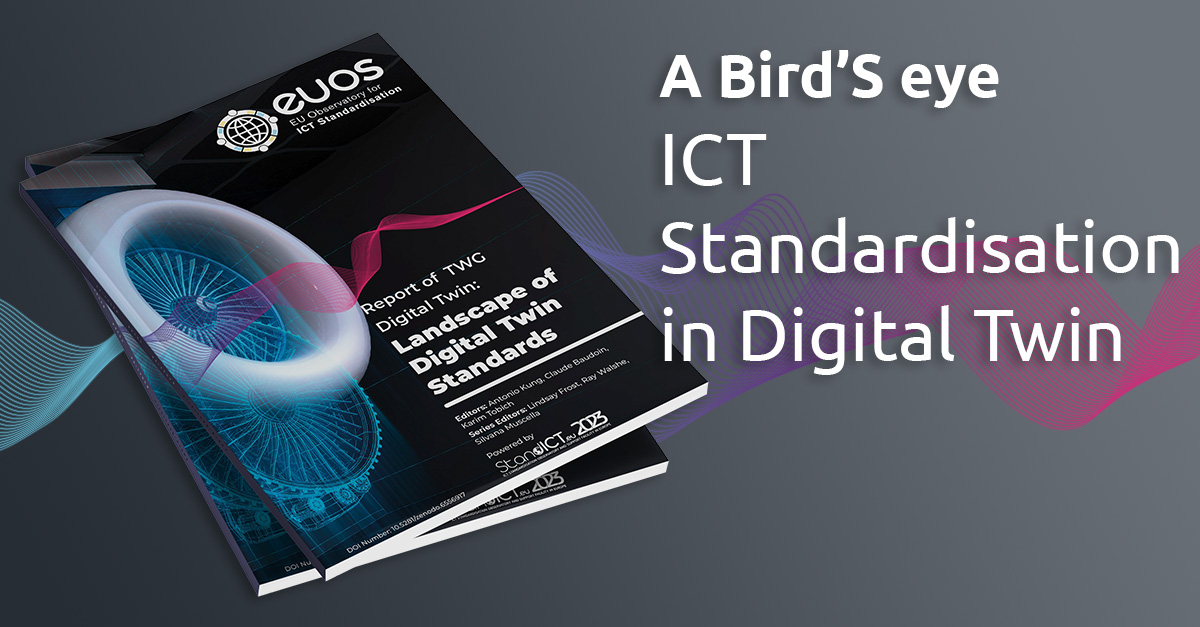Read time: 4 mins

Brussels, 09th of June 2022
The EU-funded, StandICT.eu 2023 Project, ICT Standardisation Observatory and Support Facility in Europe, has just published the fourth of a series of Landscape Reports on ICT standards, Landscape of Digital Twin Standars a palpable, go-to reference, providing an overview of the diverse array of global standardisation work underway in Digital Twins and the various organisations behind it. This information will be continuously updated and evolve via the “EUOS – Observatory for ICT Standardisation” a database powered by StandICT.eu 2023 to cover the wide-range of topics identified in the Rolling Plan for ICT Standardisation and will ultimately result in the release of a dedicated Gaps Analysis Report for each theme.
Landscape of Digital Twin Standards is the fruit of the dedicated EUOS Technical Working Group (TWG Digital Twin) set-up to harness expert advice and stimulate discussion among SDOs, public bodies, academic institutions and acclaimed specialists to provide an expert overview of documents and relevant activities for the standardisation in this field. Ultimately, the EUOS TWG Digital Twin collects an overarching spectrum of worthy documents classified by country or region, by originating body (ISO, national standards bodies, other standards development organizations, consortia, individual companies), by type of document (actual standard, report, paper, web page, etc.), and by industrial sector (manufacturing, construction, etc., or cross-sector). The Report wants also to pinpoint gaps where additional activity and investment can strengthen Europe’s position and also help to stay at the forefront of the Digital Twin domain and for the implementation and effective usage of Digital Twins with a view to attain numerous positive societal effects, among which the possibility to predict natural disasters and the resulting socio-economic crises.
We therefore welcome the StandICT.eu 2023 Landscape Report on Digital Twin, which provides an exhaustive mapping of international standards with a thorough classification of related documents, originating bodies, and industrial domains. This is the fruit of the valuable activities carried out by the Technical Working Group on Digital Twins and will be crucial to stimulate thought leadership around standardization efforts in relation to Digital Twins, as well as to contribute to relevant policy initiatives.
Eddy Hartog, Head of unit C3 in Smart Cities & Communities, DG Connect European Commission
Max Lemke, Head of unit Internet of Things (IoT), DG Connect European Commission
The editors of this landscape report have provided indices to help the reader navigate through this complex web of information. They reflect the complex domain maze and the complex integration maze of Digital Twins. Future versions of this landscape may bring more classification, grouping, and analysis of current and future standards.
Since its start, StandICT.eu 2023 has launched in EUOS 11 other like-minded Technical Working Groups tackling ICT fields such as Blockchain (TWG BLOCK), Big Data Spaces and Data Interoperability (TWG BDDI), Cybersecurity (TWG Cyber), Artificial Intelligence (TWG AI), Trusted Information (TWG TRUSTI), Digital Twin (TWG Digital Twin), Iot and Edge Computing(TWG EDGE & IoT), Ontology (TWG Ontology), Big Data For Smart Cities (TWG Big Data For Smart Cities), Robotics (TWG Robotics) and Standards Education (TWG ACADEMY) where further Landscape and Gap Analysis Reports will be published as part of the series.
In parallel, StandICT.eu 2023 is providing 3M EURO to fund European ICT experts through a series of (9) Open Calls to participate in international Standardisation Developing Organisations' working groups across the wide-range of topics identified in the EC Rolling Plan for ICT Standardisation..
From the Authors:
Digital twins have not even reached the point at which specific, normative standard specifications have emerged for components of the technology proper. However, there is a “primordial soup” of standards related to supporting technologies (systems modeling, security, communication protocols, data formats, etc.), as well as glossaries, guidelines, papers and reports that all serve to inform the work of developers and users of digital twins. Building a landscape of these documents is therefore a useful and timely endeavor – as long as the reader keeps in mind that this is a rapidly evolving situation and that this landscape will certainly need to be updated in a few years’ time.
Antonio Kung, Convenor SC41 Advisory group on IoT and digital twin EUOS TWG Digital Twin Chair Editor
Dip into the Report [2] or join one of the Technical Working Groups to make your contribution!
Take the advantage from EUOS Discussions Groups Space to have an exchange with our Community, we have organised the discussions areas based on topics!
Apply to one of our Open Calls to fund your standardisation work!
For further information, please reach out at info@standICT.eu